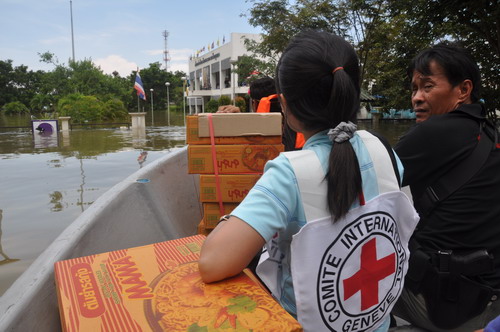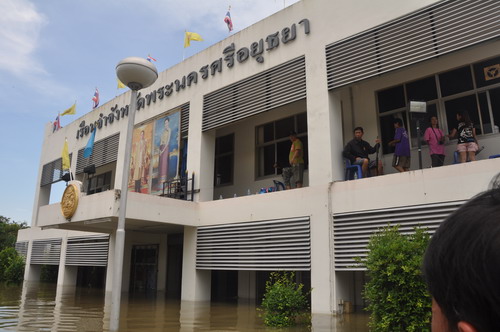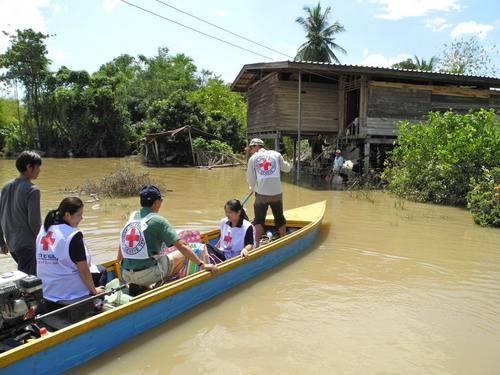They are in the same society and face the same disaster as everyone else but what is different for them is that they cannot move around or communicate freely. During this time of crisis, having food, shelter and clothing may come second to news from the ones they want to hear from.


News of the transfer last week of 603 prisoners from Bang Khwang Prison to Songkhla Central Prison might have reminded many of us that they are in the same society as us, and are very much facing the same hardship as everyone else. But the difference is that they cannot move around or communicate freely. In these times, having food, shelter and clothing may not be as important as news from the ones they want to hear from.
Bjorn Rahm, Protection Coordinator from International Committee of The Red Cross (ICRC) told Prachatai about phone calls to the families of the prisoners, which the ICRC has been doing for months and is still doing.
“We ourselves may be concerned more about food, drinking water and assistance, but one thing that might not occur to us is knowing how our loved ones are doing.”
Having coordinated with the Department of Corrections and Thai Red Cross, Rahm said what the ICRC has discovered is that many prisoners are concerned about their families. Many have lost contact and don’t know their fate. News about people close to them therefore becomes one of the important things for prisoners during the floods.
Around 30 prisons countrywide have transferred prisoners due to floods. As a result, some prisons have received a few thousand extra, while some might receive over a thousand. There are 140-150 prisons in total nationwide, so that means two third of prisons in Thailand have to receive more prisoners and cope with increased numbers.
About 80-90 prisons have received additional prisoners transferred from prisons around Bangkok, Ayutthaya and Pathum Thani that have been flooded or are about to be flooded. Not only have flooded prisons been affected. The additional prisoners are also a problem.
Rahm said, “Apart from basic material needs, the prisoners also needed contact and communication with their families about where they are, since people are likely to be concerned when they hear news from the media that the prisons are flooded. They also want to be reassured where their loved ones are and whether they are safe.
ICRC has now deployed one team in Phitsanulok and one in Songkhla, which are holding 500 and 1,000 prisoners respectively. Once the prisoners are transferred and it is confirmed that they will stay there for some time before being transferred again, the teams in the field will collect information to be communicated back to the families.
The volunteers obtain information about the families of prisoners from the Department of Corrections, call them to inquire about their situation, and pass the information on to the prisoners. However, the problem at the moment is that the uncertainty in the flood situation and the prisoner transfers makes it difficult to collect information.
Asked about the unfinished transfers of prisoners which creates a problem for prisoners in accessing information about their families, Rahm said the Department of Corrections has hotlines where families can inquire whether prisoners have been transferred, because sometimes it is hard to get information.
From the latest figures, 1,500 prisoners have been able to contact their families, a long way from the more than 30,000 still waiting for news from people worried about them.
Obervations on Preparedness and Insufficient Information on the Crisis
ICRC has helped out in 29 places of detention – 24 prisons and 5 juvenile centres, with around 40,000 prisoners. What ICRC teams have noticed is that the transfer of sick prisoners from flooded prisons was sometimes carried out urgently after it was impossible to cope with the flow of water.

Assistance in the form of basic materials has been supplied by the ICRC in coordination with the Thai Red Cross and the Department of Corrections. Jacques Stroun, Head of the ICRC Regional Delegation in Bangkok, said basic assistance prioritized dealing with the floods in the form of sandbags and pumps, health care and drinking water.
No matter how many supplies are prepared, people in disasters cannot survive without drinking water, and the ICRC has seen that management procedures for this were not prepared.
Julian Jones, Asia Regional Water and Habitat Engineer, said supplying large quantities of bottled water may not be the solution to this problem. Donating bottled water will certainly solve the initial problem, but transporting large amounts of bottled drinking water during floods is difficult. Eventually you have to think about producing drinking water. There should be equipment for producing drinking water on site. He raised the example Nakhon Sawan Provincial Prison, which had large pots to boil water for 3,500 prisoners (using 3 boiling pots and 8 large water containers).
With respect to protection Jones noted that there were no preparations for coping with the floods in Thai jails that could be called well-prepared. And the problem of not being able to transfer prisoners because a large number of prisons are already full and in some cases overfull led many prisons choose to protect their sites by preparing sandbags and water pumps. Many were isolated by flooded roads and transportation was cut off.
“Talking about the prisons, what we wanted was to source sandbags for defences because the prisons were the last places to experience flooding, when Thailand already had shortages of some necessities. When preparations were slow, it made the situation more difficult than before. The situation itself changed very rapidly. Prisons that built defences were severely flooded and had to order evacuation which is why there were transfers.
We also saw many cases where prisons quickly changed from completing defences to ordering emergency transfers, because the water came very quickly and in large quantities. The elevation of the site was one decisive factor. Prisons with barriers that go a metre underground can keep the water out better than those that have ground level barriers where the water can appear from below.
What they saw as very important was information on preparations which had to be specific to allow decisions to be made.
“There are many factors that determine how well a prison director could manage the problem of the floods. I haven't yet seen a prison that was well-prepared in advance. You don’t see places prepared like in Bangkok where there are sandbags protecting ATMs and built like stairs many steps higher than the ground where people have to climb over. I haven't seen cases like this. But preparation is a very difficult matter because you need very specific and definite information. You can't build structures against the floods in every prison in the same way. A prison director needs the authority to build their own defence lines as needed,” according to the ICRC Water and Habitat Engineer.
Decreasing water levels in many sites are leading to a recovery phase which may quickly end the transfer of prisoners and management of news of prisoners in the near future. But observations on coping with this disaster are something that Thai people must find answers for without letting it end with no lessons learned.
Prachatai English is an independent, non-profit news outlet committed to covering underreported issues in Thailand, especially about democratization and human rights, despite pressure from the authorities. Your support will ensure that we stay a professional media source and be able to meet the challenges and deliver in-depth reporting.
• Simple steps to support Prachatai English
1. Bank transfer to account “โครงการหนังสือพิมพ์อินเทอร์เน็ต ประชาไท” or “Prachatai Online Newspaper” 091-0-21689-4, Krungthai Bank
2. Or, Transfer money via Paypal, to e-mail address: [email protected], please leave a comment on the transaction as “For Prachatai English”
